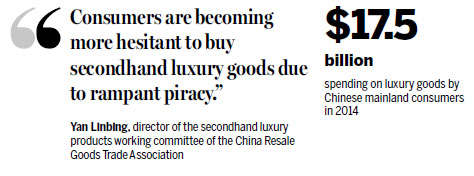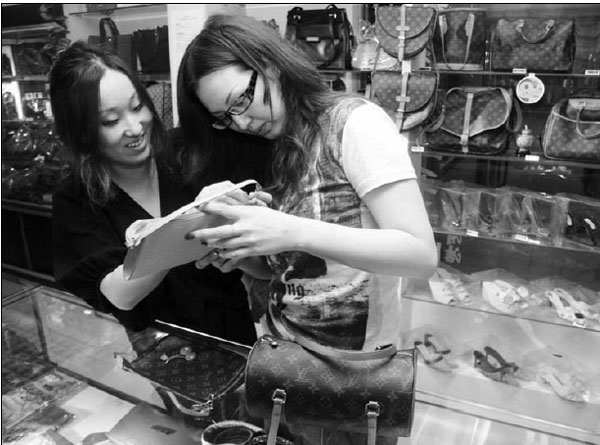China strengthens rules on used luxury goods
As well as playing a leading role in ensuring the health of the world's luxury goods market, China has also witnessed obvious sales growth in secondhand luxury goods in recent years.
However, China's secondhand luxury goods market will struggle to develop without a regulatory body capable of authenticating goods, experts said.
Statistics from Bain & Company, a leading global management consulting firm, show that consumers on the Chinese mainland purchased 115 billion yuan ($17.5 billion) worth of luxury goods in 2014, accounting for 47 percent of the world's total sales revenue in the sector.
From 2011 to 2015, China's secondhand luxury goods industry was worth about 300 billion yuan.
To help regulate the market and protect China's international image on safeguarding intellectual property rights, the secondhand luxury products working committee of the China Resale Goods Trade Association announced on May 17 the establishment of a long-term cooperation program with the luxury identification center of the China Certification and Inspection Group.
Yao Jin, general manager of CCIG Beijing, said the center, which has advanced laboratory technologies, is one of the most respected third-party testing institutions in China.
Established in 2015, it has set up partnerships with several government organs and provided information and training to customs officers, e-commerce operators and bricks-and-mortar store owners.
Yao expressed his hope that through cooperation with CRGTA, the center could more effectively combat counterfeit products in China's secondhand luxury market and protect the IP rights of both consumers and brand holders.
China now has more than 2,000 stores dedicated to selling secondhand luxury goods.
Yan Linbing, director of CRGTA's secondhand luxury products working committee, said the market will struggle to meet its undoubted development potential in the current chaotic climate.
"Consumers are becoming more hesitant to buy secondhand luxury goods due to rampant piracy," Yan said. "There is no way for them to determine whether or not the products are genuine, and practically none of the luxury brand stores offer authentication services.
"Reassuring consumers is now a major task for us and that's why we looked for cooperation with CCIG - we believe such cooperation is necessary," he added.
The working committee and the center will soon open an office near Beijing SKP mall - China's leading luxury department store - where customers can bring branded secondhand bags, accessories, clothes, jewelry and watches to be authenticated. Customers will get the results in five to seven days.
More offices will be set up in provincial cities across the country in the next two years.
Yan said that any member company found selling fake secondhand luxury products would face a series of measures, including disclosure on the committee's official website and cancellation of their membership of the working committee for three years.
Established in February, the working committee now has over 100 member companies.
haonan@chinadaily.com.cn
|
Customers select handbags at a secondhand luxury store in Tianjin. Cheng Zi / For China Daily |

(China Daily 05/25/2016 page17)









